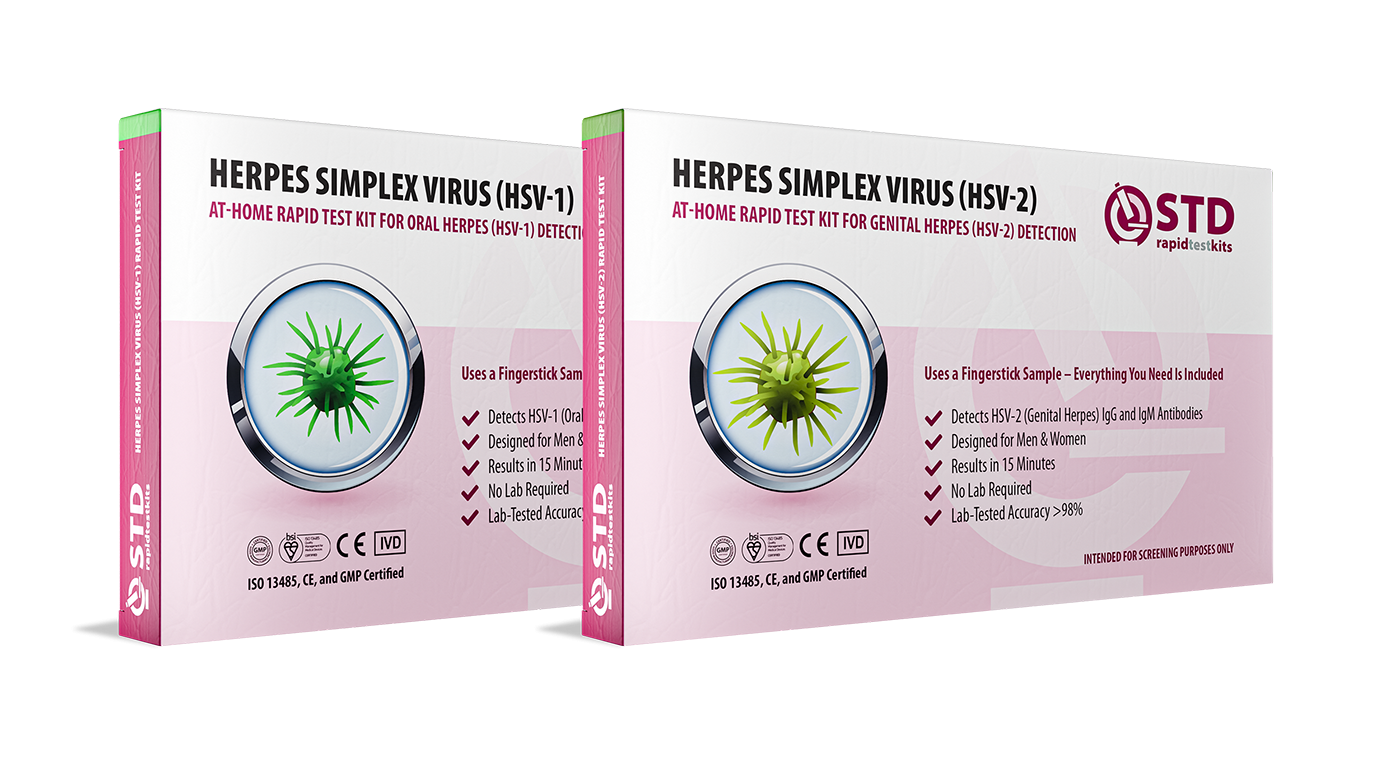Quick Answer: Yes, you can get herpes (especially HSV-1) from kissing, oral sex, or skin contact, even without visible sores. Shared utensils or towels are extremely low risk, but not zero. Herpes spreads most easily through direct contact with infected skin or saliva.
Why This Guide Matters (Especially If You Feel Confused or Blindsided)
This article is for anyone who feels like they didn’t “do enough” to deserve an STI diagnosis. For people who are newly diagnosed and struggling to connect the dots. For partners trying to be honest, but not sure how much risk a kiss or a cold sore really carries. And for the thousands of people each month who Google things like “can you get herpes from sharing a drink” or “is kissing dangerous?”
Maybe you’re in a new relationship. Maybe you kissed someone on a night out. Maybe you had oral sex but assumed it was low risk. Whatever brought you here, what matters now is clarity, not shame. This guide will break down how herpes simplex virus actually spreads, what’s real and what’s myth, how long it lives on surfaces, and what you can do if you think you’ve been exposed.
Herpes Isn’t Just About Sex, It’s About Skin, Saliva, and Silence
Let’s cut to the reality: Herpes simplex virus (HSV) doesn’t require sex to spread. It requires contact. That contact can come from lips, mouths, genitals, hands, or even faces rubbing during sleep. HSV-1 is often labeled “oral herpes,” while HSV-2 is traditionally “genital herpes.” But that old-school divide doesn’t reflect how people live, or how herpes moves.
If someone with HSV-1 has a cold sore, their saliva and the skin around their lips are loaded with virus particles. Kissing them directly transfers that virus to your skin. And you don’t need a full makeout session, either. A quick peck when the skin is shedding, even if no sore is visible, can be enough. The same goes for oral sex. If someone with oral HSV-1 goes down on a partner, that partner can end up with genital HSV-1.
One study from the CDC estimates that over 47% of Americans under 50 have HSV-1, and most acquired it during childhood or adolescence. But oral HSV-1 is increasingly becoming a genital infection through oral sex. That means what starts as a “harmless cold sore” on someone’s lip can wind up causing painful outbreaks in a partner’s genitals, without anyone realizing the risk.

People are also reading: Can STDs Really Cause Cancer?
Scene: The One-Night Kiss That Turned Into a Wake-Up Call
Marcus, 26, didn’t think much of the kiss. It was spontaneous, after a show. The girl had a healing scab near her lip, but he assumed it was a zit. A week later, a blister formed on the inside of his lower lip. It burst, then crusted. He ignored it. Then it happened again, two months later. That time, it spread to his cheek.
"I looked it up and everything said cold sores are just annoying, not serious," he said. "But then I read something about oral herpes being lifelong. And I realized, this wasn’t going away."
Marcus’s doctor confirmed it: he tested positive for HSV-1. The likely source? That one kiss. He never had sex with her. They didn’t even go back to her place. That’s how little exposure herpes sometimes needs to make itself at home in your body.
Let’s Talk About Towels, Utensils, and Shared Items
So, what about those low-contact situations? Can you really catch herpes from sharing a towel or a fork? Here’s what the data tells us: it’s possible, but rare. Herpes is a fragile virus. It doesn't live long outside the human body, usually less than a few hours, and even less on dry surfaces. But under the right conditions (warm, moist, fresh saliva), there could be a theoretical risk.
Here’s what science and clinical experience suggest about common fears:
| Item or Action | Herpes Transmission Risk | Details |
|---|---|---|
| Kissing (open mouth) | High | Especially during active outbreaks or asymptomatic shedding |
| Kissing (closed mouth) | Moderate | Risk depends on contact with infected skin or saliva |
| Sharing utensils or cups | Low | Possible if shared immediately after contact with saliva during outbreak |
| Using same towel or washcloth | Very Low | Virus doesn’t survive well on fabric; moist environments carry slightly higher risk |
| Toilet seats, bedding, clothing | Negligible | Not considered transmission routes |
Table 1. Common transmission concerns around everyday contact items. Most fears are overblown, but direct contact still matters.
Bottom line: the further away you get from direct skin or saliva contact, the lower the risk becomes. But it’s not zero. That’s why people living with herpes are advised to avoid sharing personal items during outbreaks, especially items that touch the mouth or genitals.
Check Your STD Status in Minutes
Test at Home with RemediumGenital & Oral Herpes Test Kit

 For Men & Women
For Men & Women Results in Minutes
Results in Minutes No Lab Needed
No Lab Needed Private & Discreet
Private & DiscreetOrder Now $75.00 $98.00
For all 2 tests
Is It Herpes If I Never Saw a Sore?
Here’s one of the most maddening parts about herpes: you don’t always know when it’s being passed around. Many people with HSV-1 or HSV-2 have no symptoms at all. Others get mistaken symptoms, itchiness, tiny cracks in the skin, tingling, a pimple-like bump, and never think twice. But that doesn’t stop viral shedding. You can be contagious even when you feel completely fine.
This means someone can give you herpes without lying, without knowing, and without having a visible sore. Asymptomatic transmission accounts for a huge portion of new infections. It’s not about dirty or dishonest behavior, it’s about biology and silence.
And if you were exposed, the first outbreak can appear anywhere from 2 to 12 days later. Some people get symptoms within a week. Others might not notice anything for months, until stress, illness, or hormonal changes trigger a flare.
How Do You Even Test for Herpes?
If you’re wondering how to confirm whether you’ve got herpes, you're not alone, and you're not overreacting. Herpes testing is confusing because there’s no one-size-fits-all test. It depends on whether you have symptoms, where the symptoms are, and when they showed up. Here’s how it works:
If you have a sore or blister that is easy to see, a doctor can swab the area and use PCR to test it directly for viral DNA. This is the best way to tell if there is an active outbreak. If the sore is already healing or you never had one, your doctor may suggest a blood test instead. Blood tests look for herpes antibodies, which your body makes after you get the virus. What's the catch? It can take weeks or even months for those antibodies to show up, and not all blood tests can tell the difference between HSV-1 and HSV-2 perfectly.
That’s why the timing of your test matters just as much as the type. Here's how the options compare:
| Test Type | What It Detects | Ideal Timing | Limitations |
|---|---|---|---|
| Swab PCR (sore present) | Active virus | 2–5 days after sore appears | Only works if you have a lesion |
| Blood Test (IgG antibodies) | Immune response | 4–12 weeks after exposure | May miss recent infections |
| Rapid Herpes Home Test | Antibodies (type-dependent) | 12+ weeks for best accuracy | False positives possible; confirm in clinic if unsure |
Table 2. Herpes testing options. The right test depends on symptoms and timing.
If you’ve had a mysterious sore, blister, or crack in your skin, especially after kissing or oral sex, it’s worth testing. And if you’re not sure what you’re looking at, that’s okay. You don’t have to diagnose yourself. That’s what tests are for. What matters is knowing that herpes doesn’t always come roaring in. Sometimes, it whispers.
Scene: When the Cold Sore Becomes Something More
Leila, 23, had a cold sore on and off since high school. She thought nothing of it, her mom got them too. But after a new hookup, she developed painful blisters on her vulva. She panicked. Her OB-GYN confirmed it: genital HSV-1. Leila’s mouth had likely passed it to her partner, and he had passed it back to her genitals. They had used a condom, but it didn’t cover everything.
"I didn’t even know that could happen,” she said. "I felt like I’d infected myself."
She hadn’t. She’d just lived in a world where people weren’t taught the full story. Now she carries valacyclovir and talks openly about testing, because what happened wasn’t shameful. It was human.
Don’t Wait and Spiral, There’s an Easier Way to Know
If your mind is racing and every tingle on your lip or groin makes you flinch, you’re not being dramatic. You’re being careful. And you deserve clear answers. The good news? You don’t have to wait weeks for a clinic visit or feel awkward at the pharmacy. You can get tested privately, from home, using an FDA-approved Herpes Rapid Test Kit.
It arrives discreetly, works with a small blood sample, and gives you results in minutes. It's not about paranoia, it’s about peace of mind. Testing from home gives you control over your health, your timeline, and your choices.
Whether you’re checking a partner’s status, confirming a diagnosis, or just want to stop Googling your symptoms every night, one test can be the difference between spiraling and stepping forward.
Can Herpes Live on Surfaces? (Short Answer: Not for Long)
One of the most searched questions about herpes is whether it can live on things like razors, lipsticks, or gym equipment. The answer? Not very well. Unlike viruses that spread through the air or thrive on surfaces (like the common cold or COVID-19), herpes needs moisture and live cells to stay active. Once exposed to air, the virus begins to break down quickly.
Laboratory studies suggest herpes may survive for a few hours under optimal (warm, wet) conditions, but transmission via inanimate objects is exceedingly rare. That said, there are outlier cases, especially when shared items are pressed against skin or mucosa during an outbreak. Think freshly used towels on open skin, or razors with microscopic blood traces.
So while you shouldn’t panic about towels or lip balm, it’s wise to avoid sharing personal hygiene products, especially during outbreaks. Not because it's a high risk, but because it’s a simple step that protects everyone.

People are also reading: The STD Trifecta: How HPV, HIV, and Herpes Are Linked to Cancer
How Herpes Spreads Without You Knowing
The scariest part about herpes isn’t the symptoms, it’s the silence. Most people who carry the virus don’t even know they have it. That’s because herpes can lie dormant for years. Or cause such mild symptoms that it gets mistaken for dry skin, razor burn, or a bug bite. But even when you can’t see or feel it, the virus may still be active under the surface.
This is called asymptomatic shedding. It’s when the virus replicates and travels to the skin or mucous membranes without producing visible sores. During these shedding episodes, which can happen a few times a year or more, herpes is contagious. Which means yes, someone who “never has outbreaks” could still pass the virus during a kiss, during oral sex, or even during skin-to-skin contact in the mouth or genital area.
Studies show that people with HSV-2 shed virus asymptomatically on 10% to 20% of days, and HSV-1 (when genital) sheds on fewer days, but still poses risk. Shedding is more frequent in the first year after infection, and may increase during illness, stress, menstruation, or skin irritation.
Scene: The Partner Who Didn’t Know
Riley, 31, tested positive for HSV-2 after their first major outbreak. They were devastated, and confused. They hadn’t cheated, hadn’t had sex with anyone new in over eight months. Their partner, Sam, had never had a sore. But when Sam got tested, the result came back positive too. They had likely transmitted it unknowingly, months earlier.
"We blamed each other for days," Riley said. "Then we realized neither of us knew. We just didn’t know to ask."
That realization, that herpes doesn’t require visible symptoms or recent sex, is hard to accept, but it’s key to reducing stigma. The virus is sneaky. The people who have it are not.
Check Your STD Status in Minutes
Test at Home with Remedium7-in-1 STD Test Kit

 For Men & Women
For Men & Women Results in Minutes
Results in Minutes No Lab Needed
No Lab Needed Private & Discreet
Private & DiscreetOrder Now $129.00 $343.00
For all 7 tests
What About Prevention? How to Lower the Risk Without Fear
While herpes can spread through kissing and oral sex, the good news is that there are ways to reduce the risk, without giving up intimacy. Knowing someone’s status helps. So does avoiding direct contact during outbreaks. And if someone’s on daily suppressive antiviral medication (like valacyclovir), their risk of transmitting herpes to a partner drops by roughly 50% or more.
Using barriers like condoms or dental dams when touching the mouth or genitals can also help, but they don't cover all of the skin. In the end, making smart choices is the key to preventing herpes. And that means having honest talks, preferably before skin touches skin.
This is how different ways to prevent things compare when it comes to lowering risk:
| Prevention Strategy | Effectiveness | Notes |
|---|---|---|
| Daily antiviral meds | High | Reduces shedding and transmission; best when combined with other methods |
| Condoms or dental dams | Moderate | Helps reduce genital transmission but doesn’t protect areas not covered |
| Avoiding contact during outbreaks | High | Crucial during visible symptoms or tingling phases |
| Regular testing and open communication | High (social benefit) | Promotes informed consent and risk awareness |
Table 3. Risk reduction methods for herpes transmission. No single method is perfect, but layering strategies helps.
The point isn’t to live in fear. It’s to live with knowledge. Herpes doesn’t make anyone dirty, dangerous, or undateable. But pretending it’s only about sex, or only happens to “certain people”, keeps everyone in the dark.
What to Do If You Think You Got It from a Kiss
If you kissed someone recently and now have a suspicious blister, burning, or unusual tingling, especially around your mouth or lips, it’s worth getting tested. Even if you feel embarrassed. Even if you think it’s “just a cold sore.” Knowing your status helps you protect yourself and your partners. It also helps you get access to antiviral treatment, which can reduce outbreak severity and frequency.
If you're unsure whether it's herpes or something else (like a pimple, canker sore, or irritation), a medical provider can often tell with a quick look, or a swab. And if symptoms are gone, a blood test may still be useful down the road. Just know that false negatives are common early on, so retesting later may be necessary.
If you’re not ready to go into a clinic, you can test at home with a Herpes Rapid Test Kit from STD Rapid Test Kits. It’s discreet, private, and doctor-trusted. Testing doesn’t mean something is wrong. It means you care enough to get answers.
When Herpes Comes With Guilt, Shame, or Panic, You’re Not Alone
There’s something deeply unfair about the way herpes makes people feel. The virus itself is manageable. But the stigma? That can linger longer than any blister. If you’re struggling with shame, it’s not your fault. You’ve probably been taught that STDs are punishment for recklessness, or that kissing should be safe, or that you’re somehow “bad” if you get infected. None of that is true.
Herpes is common. It’s usually mild. And most importantly, it doesn’t define you. Millions of people live full, joyful lives with herpes, dating, loving, parenting, kissing. You don’t have to earn the right to be cared for. You already deserve it.
FAQs
1. Can I really get herpes from just a kiss?
Yes, and that’s not scare talk, it’s biology. If someone has HSV-1 (the virus that causes cold sores), even one quick kiss during a shedding phase can transmit it. The person doesn’t need to have a big, visible sore. The virus lives in saliva and skin, and sometimes it’s active without throwing up a red flag.
2. What if I didn’t notice any symptoms, could I still have herpes?
100% possible. Many people carry herpes and never know it. First outbreaks can be so mild they’re mistaken for a pimple or razor burn. Others have zero symptoms for years. The virus doesn’t always announce itself, which is why testing matters, especially if a partner has tested positive or had a cold sore.
3. How long does herpes take to show up after exposure?
If it’s going to show up, most first symptoms appear within 2 to 12 days. But here’s the twist: some people don’t get symptoms until weeks or months later, or only after a trigger like stress, illness, or friction during sex. The virus works on its own unpredictable clock.
4. Can I pass herpes to someone even if I don’t have a sore?
Unfortunately, yes. That’s called asymptomatic shedding, and it’s herpes’ sneakiest move. You might feel fine, look fine, and still be contagious. That’s why people on daily suppressive meds still practice precautions, because the virus doesn’t ask permission before it spreads.
5. I think I got it from oral sex. Is that possible?
It’s not just possible, it’s common. HSV-1 (typically oral) can be passed to the genitals through oral sex. That means someone with a history of cold sores could unknowingly give you genital herpes, even if they were being careful. It’s one reason why “no symptoms” doesn’t mean “no risk.”
6. Can I give someone herpes by sharing a drink or fork? Very unlikely, but not zero. Herpes doesn’t thrive outside the body for long, especially on dry surfaces. Still, if someone with an active sore sips from a cup and you drink right after, it’s not impossible. That said, skin-to-skin contact remains the main route of transmission.
7. What’s the difference between HSV-1 and HSV-2 again?
HSV-1 usually lives around the mouth. HSV-2 tends to settle in the genitals. But they’re more like siblings than strangers, they can show up in either place. You can have HSV-1 genitally (from oral sex), or HSV-2 orally (though that’s less common). The labels don’t matter as much as the location and symptoms.
8. Is herpes dangerous if I’m pregnant or immunocompromised?
It can be, which is why awareness is crucial. For pregnant people, especially with a new infection late in pregnancy, herpes can pose serious risks to the baby during delivery. For folks with weakened immune systems, outbreaks may be more severe or frequent. Talk to your provider if this applies to you, it’s manageable, but it deserves attention.
9. If I test positive, am I contagious forever?
Let’s reframe that: you may carry the virus for life, yes. But contagious 24/7? No. Most of the time, you’re not shedding virus at all. And when you are, meds like valacyclovir can drastically reduce both shedding and outbreaks. This doesn’t make you broken. It makes you informed.
10. Can I still date, kiss, and have sex if I have herpes?
Absolutely. People with herpes date. They fall in love. They get married. They have amazing sex lives. The key is communication and care, not celibacy. Herpes is a skin condition that happens to be stigmatized. With honesty, meds if needed, and mutual respect, you can have all the connection you want. Seriously.
You Deserve Answers, Not Assumptions
Getting herpes from a kiss doesn’t make you naïve, reckless, or unlucky. It makes you human. This virus spreads easily and often silently, and that’s not your fault. What matters is what you do next: getting tested, talking openly, and protecting yourself and others with knowledge instead of fear.
If something feels off, or if you just want to stop guessing, get tested. Clarity isn’t just a medical outcome. It’s peace of mind.
This at-home combo test kit checks for the most common STDs discreetly and quickly, including herpes, chlamydia, gonorrhea, and more.
How We Sourced This Article: We combined current guidance from leading medical organizations with peer-reviewed research and lived-experience reporting to make this guide practical, compassionate, and accurate.
Sources
1. Planned Parenthood – Herpes: The Basics
2. Mayo Clinic – Genital Herpes Symptoms and Causes
4. Herpes – STI Treatment Guidelines, CDC
5. Herpes Simplex Virus – WHO Fact Sheet
6. Herpes Simplex Type 1 – StatPearls/NCBI Bookshelf
7. Herpes Simplex Type 2 – StatPearls/NCBI Bookshelf
8. Characterizing the transitioning epidemiology of herpes simplex virus – PMC
9. Herpes: HSV‑1 and HSV‑2 – Johns Hopkins Medicine
About the Author
Dr. F. David, MD is a board-certified infectious disease specialist focused on STI prevention, diagnosis, and treatment. He blends clinical precision with a no-nonsense, sex-positive approach and is committed to expanding access for readers in both urban and off-grid settings.
Reviewed by: J. Emmons, NP-C | Last medically reviewed: October 2025
This article is for informational purposes and does not replace medical advice.










